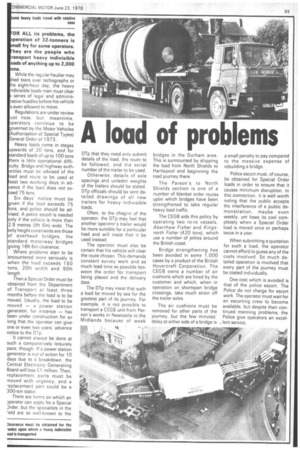o ad
Page 87

If you've noticed an error in this article please click here to report it so we can fix it.
problems
DTp that they need only submit details of the load, the route to be followed, and the serial number of the trailer to be used.
Otherwise, details of axle spacings and unladen weights of the trailers should be stated. DTp officials should be sent detailed drawings of all new trailers for heavy indivisible loads.
Often, to the chagrin of the operator, the DTp may feel that another operator's trailer would be more suitable for a particular load and will insist that it be used instead.
The operator must also be certain that his vehicle will clear the route chosen. This demands constant survey work and as much lead time as possible between the order for transport being placed and the delivery date.
The DTp may insist that such a load be moved by sea for the greatest part of its journey. For example, it is not possible to transport a CEGB unit from Parson's works in Newcastle to the Midlands because of weak bridges in the Durham area. This is surmounted by shipping the load from North Shields to Hartlepool and beginning the road journey there.
The Parson's to North Shields section is one of a number of blanket order routes upon which bridges have been strengthened to take regular heavy load traffic.
The CEGB aids this policy by operating two ro-ro vessels, Aberthaw Fisher and Kingsnorth Fisher (420 tons), which use a number of jetties around the British coast.
Bridge strengthening has been avoided in some 1,000 cases by a product of the British Hovercraft Corporation. The CEGB owns a number of air cushions which are hired by the customer and which, when in operation on shortspan bridge crossings, take much strain off the trailer axles.
The air cushions must be removed for other parts of the journey, but the few minutes' delay at either side of a bridge is a small penalty to pay compared to the massive expense of rebuilding a bridge..
Police escort must, of course, be obtained for Special Order loads in order to ensure that it causes minimum disruption. In this connection, it is well worth noting that the public accepts the interference of a public demonstration, maybe even weekly, let loses its cool completely when a Special Order load is moved once or perhaps twice in a year.
When submitting a quotation for such a load, the operator cannot afford to guess any of the costs involved So much detailed operation is involved that every part of the journey must be costed individually.
One cost which is avoided is that of the police escort. The Police do not charge for escort work. The operator must wait for an escorting crew to become available, but despite their continued manning problems, the Police give operators an excel_ lent service.




































































































































































